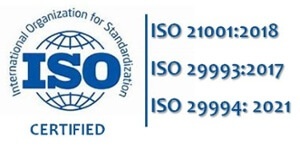
What should you expect from a well-designed, well-developed, and well-delivered e-Learning Course?
e-Learning had a bad reputation, and it was justified, but much has changed in recent years. Today’s online courses are usually a match for, and superior to, conventional training. And this, if for no other reason than for not being dependent on a presenter or tutor, lessons can be delivered to a consistently high standard.
Why Myths About eLearning No Longer Apply
Despite what was mentioned above, myths about e-learning persist, so in this post, we will examine 15 myths and respond in terms of today’s reality.
Before proceeding, we need to state some important assumptions that we’re making. These are:
- E-learning courses are well-designed, developed, and delivered with regard to the needs of adult learners.
- Courses are designed for delivery over a wide variety of operating systems and computing devices.
- Courses are delivered via a modern learning management system (LMS) keeping detailed records of the learners’ progress and results, and also capable of delivering instruction over a wide variety of operating systems and computing devices.
- Lessons include quizzes, FAQs, online exams (i.e., content that engages with the Learners), and not just 'talking heads' (i.e.videos), which are no better than boring lectures.
Table of Contents
- Myth 1: 'Group training is not possible in e-Learning'
- Myth 2: 'Evaluation is difficult with e-Learning'
- Myth 3: 'Learners must stick to the schedule of online Lessons. Once missed, lessons can't be retaken'
- Myth 4: 'e-Learning is not effective - ask anyone'
- Myth 5: 'Online Certification is not recognized'
- Myth 6: 'e-Learning cannot offer in-depth instruction'
- Myth 7: 'Learners have to attend a distant Examination Centre to take Certification Exams'
- Myth 8: 'Lessons are tedious and don't engage the Learner'
- Myth 9: 'Lessons can only be taken on a dedicated device, e.g., a workplace PC'
- Myth 10: 'No Refresher Courses are possible - you must retake the whole Course'
- Myth 11: 'In-house records of e-learning need to be inputted manually'
- Myth 12: 'e-Learning Service Providers are unknown entities. It's hard to know which training companies are legitimate.'
- Myth 13: 'The cost of ISO examination and certification will have to be added on top of the training costs'
- Myth 14: We'll have to install software on our system to take the Courses - IT won't like it'
- Myth 15: 'e-Learning Courses only cover the minimum, e.g., for a given topic, I’ll only get basic information – no examples, no context, no reinforcement of learning – everything’s an extra cost.'
- Time to think again about e-learning or blended learning?
Myth 1: 'Group training is not possible in e-Learning'
While e-learning courses are primarily designed for self-paced learning by individuals, there are no barriers to training groups of learners, provided suitable facilities are available.
A traditional computer training room or similar, with access to the intranet, is all that is required. Instead of courses being delivered from the organization’s own servers, they are delivered over the intranet.
Arguably, such group learning when overseen by a suitable supervisor (who does not have to be a professional trainer) will give the best results.
If the supervisor acts as a mentor to the group, also providing an interpretation of the lessons having regard to the organization’s own needs and requirements, superior training results can be obtained.
A supervisor can also ensure uniform progress by the group and can, if necessary, program additional periods of instruction for the weaker members of the group.
Myth 2: 'Evaluation is difficult with e-Learning'
e-Learning is no more difficult to evaluate than conventional training. An LMS will retain detailed records of lessons taken and of the outcomes of these lessons (e.g., the results of lesson quizzes).
Additionally, the LMS records detailed results of certification examinations taken, the successful completion of which forms the basis for issuing training certificates.
For learners within corporate organizations, it is possible for LMS records to be automatically linked to the organization’s own LMS or training records
Myth 3: 'Learners must stick to the schedule of online Lessons. Once missed, lessons can't be retaken'
It is not unusual for online training courses to be comprised of a combination of e-learning with conventional lecturers streamed over the Internet, together with the submission of reports and research papers.
Such online training is going to require the learner to be present on their PC or other Internet-linked devices, for example, at the time of streamed lectures.
However, with true e-learning training courses (of the kind delivered by our own company) no such restriction exists as all learning is self-paced.
Consequently, the learner is free to take instruction at any time, at any place (at work, at home, or while traveling), and on any device. And free to repeat lessons at will.
Myth 4: 'e-Learning is not effective - ask anyone'
in the early days of e-learning, especially between 2000 and 2010, there was a lot of low-quality training material marketed as e-learning.
Such courses provided simple instruction with no elaboration, reinforcement of the learning, or examples. It was a very lazy approach, presuming that the novelty of learning from a computer screen would somehow magically impart knowledge and skills.
e-Learning today is very different. Courses are well-structured, being delivered in modules, and the modules themselves are broken down into lessons. Furthermore, lessons are well-structured.
In addition to basic instruction, quizzes, FAQs, examples, scenarios, etc., are being used to reinforce the learning and thereby ensure significantly longer retention of knowledge and skills than was historically achieved.
Myth 5: 'Online Certification is not recognized'
This is a common complaint, usually heard from conventional training organizations.
However, the use of online technology is no barrier to the provision of legitimate examination of skills and knowledge learned.
The ISO management system standard for Educational Organizations (EO) is ISO 21001:2018, and it is as applicable to online training examination and certification as it is to conventional methods of learning provision.
For online as well as conventional training needs, you are recommended to seek out organizations holding ISO 21001 certification. These EOs will have been independently audited to confirm the adequacy of…
- The scope of Learning Services provided includes to determination of learning needs, stakeholder needs, and the learning content and process;
- The design of the learning services, including specification of the aims and scope of the learning services, specification of means of supporting and monitoring the transfer of learning, and curriculum planning;
- The provision of learning services, including information and orientation, ensuring availability and accessibility of learning resources, and the suitability of the learning environment;
- Monitoring the delivery of the learning services, including the evaluation carried out by EOs, evaluation goals and scope, evaluation of learning, and evaluation of the learning service.
So, with ISO 21001 Certification, it is not just the course content or the training provided that is certified/accredited. No, it is the entire learning provision process and the adequacy of all stages having been evaluated and found to meet the learner’s and the client’s expectations and needs.
See also Why deGRANDSON skipped ISO 27024 and IRCA Approval.
Myth 6: 'e-Learning cannot offer in-depth instruction'
There is no technical barrier to e-learning courses providing in-depth instruction. Historically, some e-learning courses have been disappointing in being superficial.
A well-developed course, however, will provide instruction with reinforcement of learning, opportunities to practice while learning, quizzes, and FAQs, and permit the learner to repeat difficult sections (or entire lessons, if so desired).
ble to offer independent,Myth 7: 'Learners have to attend a distant Examination Centre to take Certification Exams'
This is true of some e-learning courses and, in some circumstances, is justified (for example, practical testing of a dental hygienist's course delivered by e-learning).
There being travel and accommodation costs, perhaps, in addition to examination center costs involved, you should seek to avoid courses where examination at Testing Centres is involved.
For most online courses, such travel and expense are easily avoided without significant risk to the validity of the exam results through the provision of online exams.
Many Learning Service Providers (LSPs) test learning through the use of 'open book' online exams and by having several such exams spread throughout the course (reducing the opportunity for impersonation and increasing the likelihood of such activity being noticed).
Additionally, diligent and professional LSPs will have certification (such as ISO 29990) as evidence of the validity of their examination arrangements.
And so, if considering an e-learning course, be aware of the potential additional costs of test center examinations and seek to avoid them.
Myth 8: 'Lessons are tedious and don't engage the Learner'
As we've just said above, a well-developed course will provide instruction with reinforcement of learning, opportunities to practice while learning, quizzes, and FAQs, and permit the learner to repeat difficult sections (or entire lessons, if so desired).
Anything but boring.
To be sure that you're getting the 'real deal' check that your selected course is provided by a certified training company and/or get a personal recommendation.
Myth 9: 'Lessons can only be taken on a dedicated device, e.g., a workplace PC'
Again, this is something that's no longer true. What's called 'responsive e-learning' permits LSPs to deliver courses for any device (PC, notebook, tablet, or large-screen smartphone) on any popular operating system (Windows, iOS, Linux, and similar).
With WiFi so widely available (at work, at home, or on the move), it's possible to take e-learning courses almost anywhere. Note that both the course development (we use Adobe Captivate), and the Learning Management System - LMS (we use Inquisiq) delivering the course, need to have responsive e-learning capability.
Just be sure to check that your chosen course has this capability - in today's world, it should have.
Myth 10: 'No Refresher Courses are possible - you must retake the whole Course'
In our own field, this has certainly been a problem with conventional courses - if you want a refresher of your 5-day course, your only option is to retake the 5-day course as numbers don't justify training companies running such refresher courses.
With e-learning, this is not such a problem as most courses are modular, so refresher courses and similar 'specialist' courses can more easily be provided.
For example, with our Lead Auditor Courses (typically, 5-day equivalent duration), we offer shorter conversion, transition, and add-on courses (2-day equivalent duration), thereby fulfilling niche requirements.
The same is true for e-learning courses in many fields. If not immediately on offer, ask them. Your LSP may well be able to provide what you need at a reasonable cost.
Myth 11: 'In-house records of e-learning need to be inputted manually'
This would be the normal situation for single courses taken in isolation. However, if your organization is seeking an e-learning supplier for a series of courses, or for the same course to be taken by a number of learners, your e-learning provider should be able to provide you with a ‘live’ link between their LMS and your LMS (or training record system).
Alternatively, they should be able to provide you with summary data as a CSV file.
Myth 12: 'e-Learning Service Providers are unknown entities. It's hard to know which training companies are legitimate.'
Nowadays, competent e-learning providers will be able to offer independent, third-party accreditation and certification of their training activities or of individual courses. Beware of self-accredited organizations - check out their accreditation /certification, and also check out their references and testimonials.
Myth 13: 'The cost of ISO examination and certification will have to be added on top of the training costs'
This is certainly the rather devious practice of some less reputable organizations. Better e-learning companies will include both examination costs and costs associated with issuing certificates in the prices offered. The provision of open-book examinations online and the issue of certifications online is what you should seek.
Myth 14: We'll have to install software on our system to take the Courses - IT won't like it'
The need to install software on in-house computers in order to deliver e-learning courses is an outdated practice. Modern LMS (learning management systems) are delivered entirely over the Internet, and no software whatsoever needs to be installed locally.
Myth 15: 'e-Learning Courses only cover the minimum, e.g. for a given topic I’ll only get basic information – no examples, no context, no reinforcement of learning – everything’s an extra cost.'
The majority of e-learning courses on offer today are of short duration. Some are as short as 10 minutes and are more correctly referred to as micro-learning courses.
Short courses may, in many instances, be sufficient, especially when part of a blended course. For example, a 15-minute e-learning course on health and safety at work might be a well-matched element of a new staff member induction program.
For longer courses, say, between 10 and 40-hours duration, you should expect that the standards of a conventional training course or better will be provided.
Such courses should include quizzes, FAQs, short and long-duration scenarios, the opportunity to repeat lessons, and other elements to aid in the reinforcement and retention of learning.
Typically, these longer-duration courses are divided into modules, and the modules are then divided into short-duration lessons. This multi-layered learning approach offers the learner the benefit of being able to choose when, where, and for how long the e-learning sessions will take place.
With the technical capabilities available today, you should require courses to be available on the internet for any device (PC, Notebook, or Tablet), for any operating system, and on a 24/7 basis.
Time to think again about e-learning or blended learning?
We haven't considered the positives of e-learning in this post - reduced course cost, no travel or accommodation, no restriction as to where and when a Course is available.
Overall, as exemplified by the continuing growth in e-learning, managers are recognizing the flexibility and budget-friendliness of e-learning and blended learning. Why not try a Course and see the benefits for yourself?
We hope you've found this post informative and of help in specifying online training for your organization.
Related Courses
Related Articles
deGRANDSON Global is an ISO Certified Educational Organization
We have chosen ISO 21001 certification because, unlike IRCA and Exemplar badges (which, in our opinion, are commercially compromised), it is based on independent third-party assessment. It is a ‘university grade’ standard in use globally by schools, colleges, and universities to demonstrate their competence.




